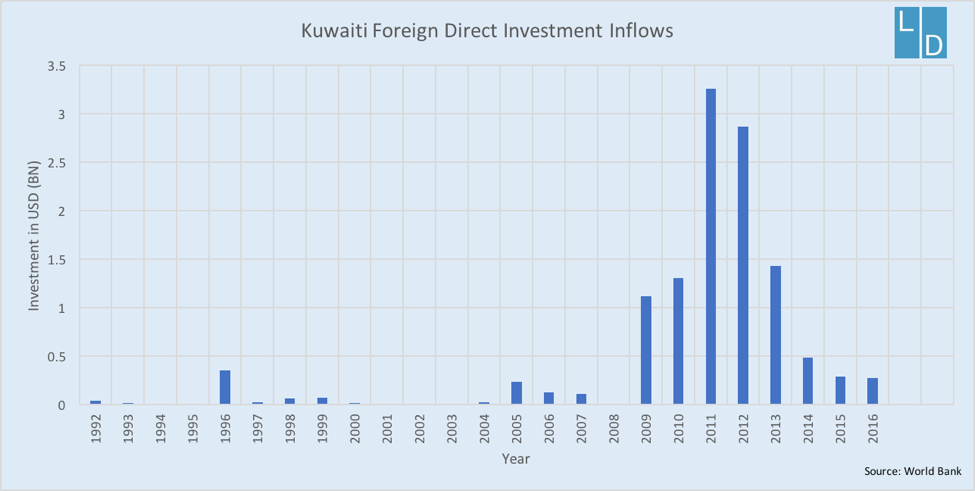Economic Risks in the Oil and Energy Sector
Primary Analyst: Mariana Gogliano
Team Leader: Duncan Spilsbury
Kuwait currently holds more than 6% of the world's crude oil reserves, and its oil and gas sector is responsible for 95% of the country's export revenues and 60% of its GDP. Considering its small area - slightly smaller than the state of New Jersey - Kuwait has a massive global presence in crude oil production, capable of producing over 2.7 million barrels per day. It currently ranks 9th in daily production rate among oil-producing countries.
Economic Risks
Kuwait’s economy is heavily dependent on the state-owned energy sector and its private sector largely relies on government spending. The country experienced its first budget deficit in 15 years due to a significant and sustained drop in oil prices – though this was seen as a helpful push for much needed economic reforms in the government, which has been resistant to implement significant private sector initiatives. The year of 2017 was forecast to have lower oil production numbers, with barrels sold at lower prices when compared to previous years.
Kuwait does not allow private sector investments in the oil and energy market and it faces challenges to diversify its economy. Potential investors should keep in mind the enduring oscillation of oil prices. The current risk projection for local turmoil is low, although investment risk factors such as taxation and labour costs continue to be high. Due to its budget deficit, there is a risk that the cut down in spending could have a negative effect on economic growth.
Mitigating Strategies
Despite the complications of private investment in the oil sector, there are good opportunities for foreign stakeholders in this segment. The best prospects in the energy sector are in the following areas: consulting services, EPC services, refining technologies, environment consultants, control and instrumentation systems, and secondary recovery systems. There is also strong demand for drilling services, as Kuwait has announced intentions to increase its oil and gas production over the next ten years. A pipeline is also planned.
Moreover, the Kuwaiti government has introduced the Public-Private Partnership (PPP) programme, which aims to promote collaboration between the public and private sectors to develop quality infrastructure and services for Kuwaiti citizens. This initiative has revitalized the Kuwait Authority for Private Partnerships (KAPP), which is currently in the process of initiating several high-impact projects in the power, water/wastewater, education, health, transportation, communications, real estate and solid waste management sectors. These were identified as key sectors for increasing economic diversification and private sector involvement in Kuwait. KAPP seeks and selects projects that advance Kuwait's development goals.
In addition to the PPP, in 2015 the Kuwaiti government approved a budget of $118 billion for the Kuwait Development Plan (KDP), which focuses spending on both oil and non-oil sectors. This project has the potential to boost and stimulate the country's national economy to include investments in wider sectors such as housing, education, health, airports and ports, as well as infrastructure.
Quick private-sector expansion is one of the key elements of the KDP, and in order to support the development plan the government has passed a series of reforms over the last decade to improve the operating environment for foreign companies. They include the opening of numerous sectors to 100% foreign ownership, a reduction in the corporate tax rate on foreign-owned firms from 55% to 15%, labour-market reforms that enhance hiring flexibility for employers, and an extensive privatization bill.
Since mid-2013 the Kuwaiti government has awarded contracts for numerous infrastructure projects, including the construction of an enormous gas-powered power plant and water desalination facility in Al Nour, the Al Khairan Independent Water Project (IWPP), the expansion of the Kuwait International Airport, the construction of the Sheikh Jaber Causeway, and a new campus for Kuwait University.

Conclusion
Although investors may struggle with direct investments in the Kuwaiti energy sector, ventures in a newly-established non-oil sector can be promising, since the KDP includes many large-scale infrastructure projects (including one for an urban railway system with an estimated cost of $20 billion).
Foreign businesses are also permitted 100% ownership in certain industries, such as: infrastructure (water, waste water treatment, communications); information technology and software development; hospitals and pharmaceuticals; air, land and sea freight; tourism, hotels and entertainment; housing projects and urban development. Through KDP, Kuwait seeks to propel the private sector share of the economy to 41.9%, from its current level of 26.4%. The country is also in the process of privatizing its stock exchange, national airline, telecommunications sector and postal services.

